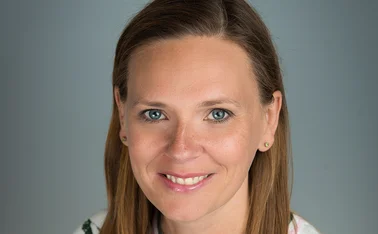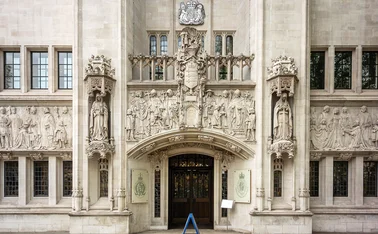
Insurers’ QC claims FCA is 'forcing a square peg into a round hole' in BI test case

Providers argue regulator’s case doesn’t work because access to premises was not prevented during pandemic as lawyers for Hiscox, Ecclesiastical, MS Amlin, Arch Insurance and Zurich make their submissions.
Jonathan Gaisman QC, representing Hiscox, continued his arguments from the day before. He claimed the Financial Conduct Authority has “thrown away the rulebook” in order to allow its causation exercise and that the regulator’s approach is not justified.
Gaisman further stated that the FCA’s proposed counter-factual – a situation where the pandemic had not happened – is “artificial” because it requires people to imagine something that never happened.
He maintained that Hiscox’s proposed counter-factual, the Sweden defense, was “far from artificial”, adding: “It’s what happened in Sweden and it might have happened here in connection to Covid-19 if the government had taken a different approach.”
He further dismissed the FCA’s claim that different elements of loss that businesses have suffered cannot be separated.
“There is no warrant for treating the loss as indivisible as a matter of fact, there’s no evidence that it is,” Gaisman continued.
“It’s possible to conceive over an episode which has lasted for several months that loss can be caused by different things at different times.”
Ecclesiastical
Gavin Kealey QC, who represents both Ecclesiastical and MS Amlin, agreed with Gaisman’s point on the loss not being indivisible.
He also outlined that Ecclesiastical’s policies include cover for any occurrence of a specified disease being contracted by a person at the premises or within a radius of 25 miles of the premises, and any occurrence which causes restrictions in the use of the premises on the order or advice of the competent local authority.
He emphasised that the cover is subject to “an infectious disease carve out” that carved out the closure or restricted use of premises due to the order of a competent local authority, and that Ecclesiastical had intended to provide cover for some specified infectious diseases.
However, he noted that the policy was not designed to respond to a pandemic where the closure had been imposed because of occurrences of infectious disease outside of the local area. “The 25-mile restriction is important in other context, even if the disease was confined to the local area,” he continued.
“If the plague broke out in Newcastle, Hancock [Matt Hancock, Secretary of State for Health and Social care] would send people up there. He wouldn’t just let the local authority handle it.”
Kealey also submitted arguments around causation, continuing points he made last week on behalf of all of the insurers involved in the test case.
In Ecclesiastical’s view the insured peril is prevention of access to premises, which has to be due to action taken by the government, which has to be due to an emergency that can endanger human life.
He outlined: “Firstly, the insured peril is not the emergency. The emergency’s function was to identify that to which the government’s action must be a response to.
“It’s only where government action is due to the emergency and such action causes access prevention that cover is triggered.”
Kealey added that the emergency “cannot become the insured peril by the backdoor” and that the peril can’t be converted just because the emergency is mentioned in the policy.
MS Amlin
Kealey also put forward MS Amlin’s defense, explaining that the policy wording stated that it covers consequential loss as a result of interruption or interference of the business carried out by a notifiable disease within a radius of 25 miles of the premises.
He highlighted that this required occurrences of the illness within the 25-mile radius.
“The issue that arises is whether the loss in this case was following the proved cases of the disease within the 25-mile area,” he continued.
Kealey argued that the use of the word ‘following’ meant that the ‘but for’ test has to be satisfied.
“The FCA says ‘following’ is a looser causal connection than resulting from and similar,” Kealey added.
He disagreed with the “jigsaw idea” put forward by the regulator, which says that because government action was responding to all actual and anticipated cases of Covid-19 it is sufficient to link the case within 25 miles to the interruption or loss.
Leigh-Ann Mulcahy QC, representing the FCA, argued last week that the word ‘following’ does not require a direct ‘but for’ link.
“What we say is in reality this issue doesn’t turn on the issue of proximate cause or a lesser cause. It turns on the issue of cause or non-cause,” argued Kealey.
He continued: “We’re saying that the word ‘following’ in this clause means directly caused by the notifiable disease in that area.
“There has to be a direct causal connection between that actual sickness sustained or contracted within the radius of 25 miles and the interruption of or interference of business carried out in those premises. It’s not good enough that sickness within area was something which occurred but doesn’t have the causal connection with the interruption.”
Kealey further argued that the phrase ‘in consequence of’ has been used interchangeably with the word ‘following’ in the disease clause in Amlin’s policies, which he noted should mean that the word ‘following’ is the same as proximate causation.
He also stated that the policies relate to losses resulting from access to the premises being prevented, however, this does not include where access or use of the premises has been hindered.
The QC added that most businesses had not been ordered to close completely during the lockdown and that staff who could not work from home were permitted to travel to work.
Kealey said: “None of the government advice was mandatory or compulsory. It was strong advice but under our constitution it was not legally binding.
He added that where businesses had been ordered to close, access to the premises had not been prevented.
“You can’t make a prevention of access cover into a prevention of use cover,” he continued.
Arch Insurance
John Lockey QC, representing Arch Insurance, made similar points in his submission, noting that most businesses insured by the provider had not been ordered to close or prevented from accessing their premises.
He detailed: “We would submit that for the purposes of main BI cover, the insured peril is damage to property and any loss of gross profit must be caused by damage to be covered.”
Adding: “Our case, in nutshell, is that if the insured’s premises can’t be accessed because of an order of a local authority, the policy will pay for loss of gross profit caused by the prevention of access.
“But the insured peril requires a qualifying emergency, government or local authority action or advice in response to emergency, and the effect must be to require or recommend prevention of access to the premises. This is not pandemic cover.”
Lockey stated that the policy is concerned with access to premises rather than restrictions on the use which can be made of the premises.
“Advice on social distancing had no effect on the means of access to the business,” he added.
“We don’t accept the FCA’s case that advice to work from home where possible constitutes as advice preventing access to insured premises.”
According to Lockey, 70% of Arch’s retail policyholders were in the category of businesses that were expressly permitted to stay open.
“How can there be a prevention of access if these businesses were permitted to be open?” he questioned.
He also argued that businesses that had not been forced to close cannot claim for profits they would not have made even if they hadn’t been forced to close, giving the effect of the pandemic on the economy and the general fear of Covid-19 and lack of consumer confidence as reasons for this approach.
“Policyholders have the burden of proof to show that the loss hadn’t been suffered if the insured peril hadn’t operated,” Lockey said.
Zurich
Today’s (29 July) proceedings will begin with Craig Orr QC, who will continue outlining Zurich’s defense after making his introductory statements at the end of the day yesterday.
He stated that the FCA is “forcing a square peg into a round hole” by attempting to achieve an objective that the policy wording was never intended to achieve.
The trial in the BI test case began on 20 July and is planned to go on for two more days. It is overseen by two judges: Commercial Court judge Mr Justice Butcher and Court of Appeal judge Lord Justice Flaux.
Only users who have a paid subscription or are part of a corporate subscription are able to print or copy content.
To access these options, along with all other subscription benefits, please contact info@postonline.co.uk or view our subscription options here: https://subscriptions.postonline.co.uk/subscribe
You are currently unable to print this content. Please contact info@postonline.co.uk to find out more.
You are currently unable to copy this content. Please contact info@postonline.co.uk to find out more.
Copyright Infopro Digital Limited. All rights reserved.
As outlined in our terms and conditions, https://www.infopro-digital.com/terms-and-conditions/subscriptions/ (point 2.4), printing is limited to a single copy.
If you would like to purchase additional rights please email info@postonline.co.uk
Copyright Infopro Digital Limited. All rights reserved.
You may share this content using our article tools. As outlined in our terms and conditions, https://www.infopro-digital.com/terms-and-conditions/subscriptions/ (clause 2.4), an Authorised User may only make one copy of the materials for their own personal use. You must also comply with the restrictions in clause 2.5.
If you would like to purchase additional rights please email info@postonline.co.uk






